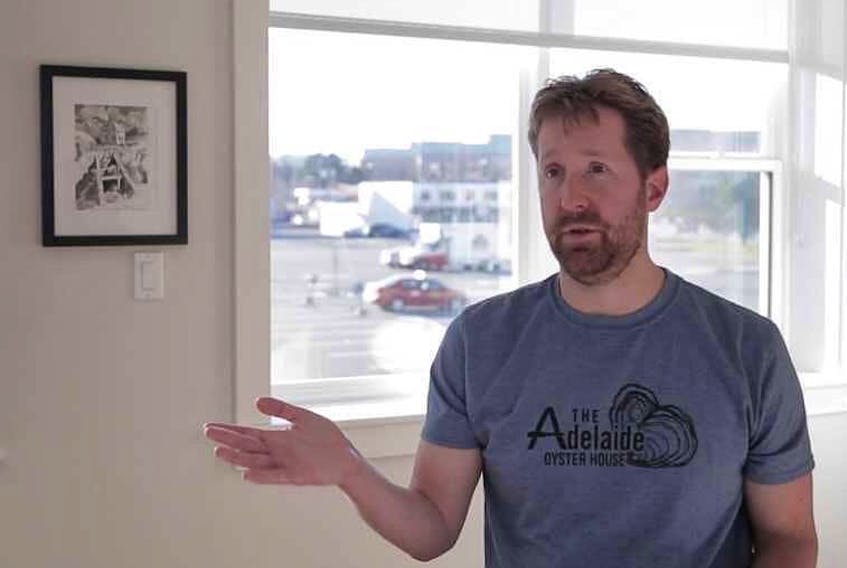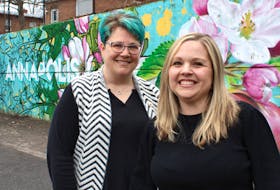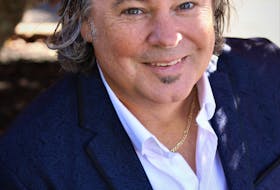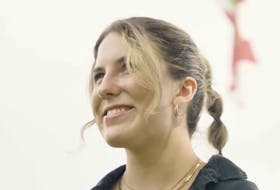ST. JOHN'S — Recovering from a brain injury doesn't necessarily end with a doctor's care. At least two local young professionals have turned their lifetimes of healing into part of their careers.
Nick Mercer, 30, was doing a master's degree in public administration at the University of Victoria in B.C. when he and a group of friends started a cycling group. One August day, they decided to take a detour on a different route than usual; one that happened to take them near a hospital.
Mercer was cycling down a hill when another cyclist app-roached him from the opposite direction. Mercer swerved, his bike skidded, and he went down over an embankment, hitting his head - and helmet - on a tree.
"They threw the helmet away - it was completely shattered," Mercer said. "You can't underestimate the importance of helmets. They really can prevent you from dying. Apparently, if I hadn't been wearing a helmet and hadn't been so close to a hospital, I'd be dead."
Mercer remained in a coma for two weeks, and was flown home to St. John's when he awoke. His speech was barely audible and he was unable to walk.

"They told me I had a brain injury, but I didn't really understand. I thought it was temporary," Mercer said. "When they told me I'd have to do rehab, I thought, 'Cool, six weeks and I'll be home.'"
It was six months before Mercer was able to walk using a walker, and, with the help of a physiotherapist, he eventually weaned himself from the device and re-learned to walk by himself. Two years after his accident, Mercer returned to Victoria to complete his degree.
Before his injury, Mercer was athletic, playing water polo and basketball and training for triathlons, and had even cycled across the country with a friend. These days he still swims two or three times a week, but his involvement in water polo is limited to keeping score. He rides a stationary bike, but said he doesn't have the co-ordination or balance to cycle otherwise. He's unable to run or jump. While his cognitive abilities seem unaffected, his speech is often difficult to understand.
Mercer, who works as a policy analyst for the provincial government, returned earlier this week from Ottawa, where he underwent his third surgery to correct the double vision he's been having since his accident. Once his eyesight is corrected, he's hopeful his balance will improve.
"I was told I wouldn't be able to walk," Mercer said. "I'm definitely getting better, and I feel like in two years or maybe five years I'll be a lot closer to where I want to be."
Mercer is a board member of the Newfoundland and Labrador Brain Injury Association, which advocates for brain injury patients and aims to improve public awareness of brain injuries. He also runs his own website, Concussion Talk, where he writes about traumatic brain injury, answers questions, and provides references and resources. The original goal of the website was self-serving, Mercer said.
"I decided to do Concussion Talk website because I wanted to talk about brain injury. I wanted to talk about issues around brain injury that affected me," Mercer said. "Since not much is known about brain injury, and since I follow a lot of sports closely, concussion in sports was very interesting to me and it alerted people about the issue. Since my speech was slightly affected and I had a lot of confidence in my writing, I knew writing was the best way to get my point across and I knew I had good points to make."
•••
Heather Watkins was riding on the back of her then-boyfriend's motorcycle in September 2004, on their way back to town after visiting a relative in Conception Bay South. While on the Foxtrap Access Road, the couple was hit by a truck that had missed a stop sign at an intersection, sending them both flying.
"I remember waking up on the ground, about five or 10 feet away from the truck. My boyfriend had been dragged with the bike, and was on the ground, about 10 or 15 feet away. I couldn't even see the bike," Watkins, 27, said.
Both Watkins and her boyfriend were wearing helmets.

While her boyfriend suffered five breaks in his legs, a neck injury and a ruptured intestine, Watkins had broken her right leg in three places - needing a metal rod embedded to support her femur - but considered herself relatively lucky, until a few days later.
That's when she started having unexplained fainting spells, at one point falling and breaking her hip. She attributed the spells to low blood sugar at first, but began noticing problems with her memory, which she said had been nearly perfect before the accident. A master's student in medicine at Memorial University, Watkins found it increasingly difficult to function at school.
In 2006, she underwent psychological testing, which pointed to a brain injury.
"I was devastated. That's the only way to describe it," Watkins said. "I was grieving, crying, mourning my old self. I had known something was wrong, but I didn't think it was that wrong."
Watkins was eventually referred to Dr. Hugh Mirolo, the province's only neuropsychiatrist. While she still suffers with symptoms of her brain injury, including problems with memory, concentration and sleep, she's miles better than she was, she said, thanks to a treatment program that includes four types of medication, two hours a day of phototherapy under a lamp that replicates sunlight, and mental/manual activities like embroidery, scrapbooking and chess.
"It has gotten drastically better. I feel a lot more confident than before. I feel proud now, in a sense, that I went through something big and got through it."
Watkins has used her brain injury as the basis for her career. She has an honours degree in biochemistry and nutrition, and works with Mirolo as a neuropsychiatry researcher. She's also the research co-ordinator for the Neuropsychiatric Patients' Association of Newfoundland and Labrador. She recently returned from Denver, Colo., where she made a presentation about the group to the annual meeting of the American Neuropsychiatric Association.
The patients' association, founded by Mirolo in 2008, is unique in that it is run for patients and their families by the patients themselves. Objectives of the group include advocacy and awareness of brain injury, research, and the promotion of neuroplasticity, or the brain's ability to heal itself. Patients participate together in activities like painting, music, origami and chess; mental/manual activities that Mirolo said encourage the brain to heal by essentially giving it exercise.
The group, which Mirolo said may eventually be opened up to anyone with an interest in brain injury issues, also provides patients with a way to connect with each other.
"One of the many benefits they get is they realize that they are not the last green canary alone in the cage facing extinction; that there are lots of people with (their condition)," he said. "It gives them a voice. It gets them out of a disability. They are no longer invisible, they are heard by somebody,

"Some of the people were completely dismissed by health care or by relatives, and all of a sudden they feel, it's real, I'm not making it up, and I'm not the only one who's having this problem. I'm not alone."
Mirolo said the group was founded as a way to provide neuropsychiatry patients with neurorehabilitation; something he said is lacking in the current health system.
A three-tiered system of care for neuropsychiatry patients is what's needed in this province, Mirolo said, adding he currently has a four-year wait list for patients with non-urgent cases.
"I'd like to see three levels of care: inpatient, outpatient and neurorehabilitation," he said.
"An inpatient unit that is dedicated to neuropsychiatry with a team of GPs, neurologists, psychiatrists and psychologists that is tuned in to neuropsychiatry is what we need, and we need it badly. Then we can create some kind of an answer to a number of people with problems."
Eastern Health did not return a request for a response to Mirolo's suggestion when contacted by The Telegram.
Watkins said she's hoping the needs of neuropsychiatry patients will eventually be recognized and better understood, both by the medical community and the public.
"It's important," she said. "We need to realize that we're all just one knock in the head away from being in the same boat."









